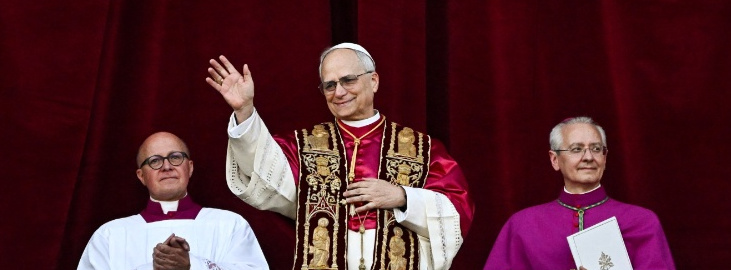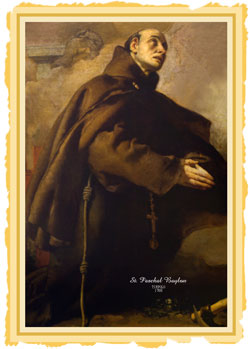We ask you, urgently: don't scroll past this
Dear readers, Catholic Online was de-platformed by Shopify for our pro-life beliefs. They shut down our Catholic Online, Catholic Online School, Prayer Candles, and Catholic Online Learning Resources essential faith tools serving over 1.4 million students and millions of families worldwide. Our founders, now in their 70's, just gave their entire life savings to protect this mission. But fewer than 2% of readers donate. If everyone gave just $5, the cost of a coffee, we could rebuild stronger and keep Catholic education free for all. Stand with us in faith. Thank you.Help Now >
Liturgy: Communion Service Instead of Mass?
FREE Catholic Classes
And More on Tabernacles
ROME, MARCH 2, 2004 (Zenit) - Answered by Father Edward McNamara, professor of liturgy at the Regina Apostolorum Pontifical Athenaeum.
Q: What responsibility do parishioners have to attend Mass on Sundays instead of going to a lay presiders service when four Masses are available on weekends within a 10-minute car drive? -- D.L., Yarmouth, Nova Scotia
A: This theme is treated in Canons 1247 and 1248 in the Code of Canon Law.
Canon 1247 states the obligation to assist at Mass on Sundays while No. 1248 Subsection 2 says that if assistance at Mass is impossible due to the lack of a minister, or for some other grave cause then it is recommended that the faithful assist at the Liturgy of the Word if this is celebrated in the parish church.
The sense of canon law is clear. Assistance at Mass is obligatory, except for a "grave cause." The use of the expression "grave cause" indicates that the obligation is a very serious one. For obligations that admit more readily to exceptions, canon law usually uses expressions such as "a just cause."
It is also important to point out that the Catholic's obligation is to assist at Mass, not to "go to church." According to the canonical and moral principle "ad impossibilia nemo tenetur" (nobody is obliged to do the impossible), when an objective impossibility exists then the consequent obligation disappears. However, the Church recommends, but does not oblige, that Catholics sanctify Sunday in some other way, such as assisting at a Communion service, following a televised Mass, or praying at home.
Thus, when a parish offers a Communion service when Mass is impossible, this is done in order to allow Catholics to follow the Church's recommendation to sanctify Sunday in some other way. But it does not substitute the Sunday obligation, which in fact no longer exists.
An objective impossibility need not always be a dramatic situation. Examples of objective impossibility could be age, illness, the need to care for a sick relation, or seasonal variations which make leaving home a hazardous task. Catholics involved in necessary Sunday occupations such as police, medical personnel and flight attendants are also exempt while on duty.
It is not always easy to judge what is objective, as conditions vary from person to person. However, Catholics should not be too light in assessing their difficulties and should be willing to make reasonable sacrifices in order to assist at Mass.
So, if a Catholic can easily assist at Mass in another parish without any great inconvenience, then in conscience he or she is obliged to do so.
Bishops and pastors also have to consider these factors. When Mass is easily available at nearby parishes, sometimes it might be best to have no Communion service at all at the local parish rather than risk disorienting the faithful as to the central importance of Sunday Mass.
A grave inconvenience of such a solution is that it could deprive those least able to find alternative arrangements such as the poor, the sick and the elderly of the comfort of at least receiving Communion.
This grave inconvenience could, however, become an opportunity to exercise and develop charity on the parish level in inviting the faithful to voluntarily share in transporting to Mass those in need.
Should this not be possible, and a significant number of people would be deprived of Communion, then it is probably best to hold the Communion service. But the faithful should be informed that this service is provided for those who have no alternatives and that those who are able should assist at the nearest Mass.
Of course, a Catholic who has even an inkling of the full meaning of the Mass would never voluntarily settle for a Communion service.
The Church makes assistance at Mass a grave obligation in order to help us overcome our weakness and tendency toward inertia through which we might deprive ourselves of our necessary spiritual nourishment.
God has no need of our presence at Mass, and we are doing him no favors by going. But we certainly have need of his presence and we are the beneficiaries of his favors.
Thus, rather than framing the question in terms of obligation, it should be seen as the loving acceptance of God's invitation to share in his Son's sacrificial banquet. The pastor's task therefore, is to inflame his faithful with a deep desire to participate fully in the greatest mystery this side of heaven.
* * *
Follow-up: Tabernacles
Following the column on veneration of the tabernacle during Mass (Feb. 17) I will take the opportunity to answer a couple of related questions of the very many still on file.
A correspondent from Florida asks if a bow of the head may substitute the genuflection as a sign of reverence toward the tabernacle. She also notices the General Instruction of the Roman Missal does not give clear instructions regarding bows of the head and asks: "Does the GIRM really mean to forbid all head bows by altar servers, even to the priests, during Mass?"
In general, a bow of the head does not substitute a genuflection as they have different meanings. A genuflection is a sign of adoration while the bow is a sign of reverence. If one is going to acknowledge the tabernacle at all, then the genuflection is the proper gesture.
As earlier mentioned, the idea of the GIRM is to emphasize the different rites of the Mass as Christ's sacrifice, and so the tabernacle is acknowledged only on entering and leaving Mass.
Even if the tabernacle is behind the altar, the genuflection is not made during Mass. Rather, a bow is made to the altar when passing (except if part of a procession).
For this reason it is liturgically preferable that all movements by servers be done in front of the altar and not between altar and tabernacle.
According to the GIRM, a bow is made before incensing the celebrant at a solemn Mass. But there is a very widespread custom of attributing to priests the bows required for bishops when the servers approach and leave him, for example, with the missal or with the lavabo for the washing of hands.
Although these bows are not specifically mentioned in the GIRM, this does not mean that they are forbidden. This document does not purport to regulate all movements in a rigid and minute manner.
Since they fall within the general principles of liturgical decorum, these bows may be continued where the custom prevails.
Another reader asks about GIRM No. 315 in the context of the Ukrainian rite. The GIRM says, "It is more in keeping with the meaning of the sign that the tabernacle in which the Most Holy Eucharist is reserved not be on an altar on which Mass is celebrated."
Our correspondent then asks: "I have recently been attending a Ukrainian Catholic church in which the tabernacle is placed on the altar, and in every Byzantine church that I have visited the tabernacle has been on the altar. So I am not sure what this document means when it says that 'not on an altar' is 'more in keeping with the meaning of the sign.' Does the sign have a different meaning in the Latin and Byzantine traditions?"
I would first observe that GIRM is written for the Roman rite and in the context of the peculiarities of the Latin spiritual tradition.
It thus has little bearing on the spiritual traditions of the other Catholic rites and, of course, has no legal force at all as the regulation of the liturgy in these Churches depends above all on their own ecclesiastical authorities in communion with the Holy See.
I am no specialist in the Eastern liturgical traditions, but it is fair to say that in general the spiritual role of the tabernacle is different in most Oriental rites than in the Latin.
While all Catholic and non-Catholic Eastern Churches share the same faith with regard to the real presence of Christ in the Eucharist, and all of them reserve the Eucharist -- above all, for the purpose of viaticum -- most of them have not developed a tradition of Eucharistic devotions similar to those practiced in the Roman rite.
Thus on the whole they do not have practices such as exposition and adoration of the Blessed Sacrament or visits to the tabernacle.
This means that in the overall spiritual context the sign of the tabernacle with respect to the altar is different in the Eastern rites and in the Roman rite in its present form and so, having the tabernacle on the altar does not send the same message in each case.
For this reason both practices are justified within their own context.
Contact
Catholic Online
https://www.catholic.org
CA, US
Catholic Online - Publisher, 661 869-1000
info@yourcatholicvoice.org
Keywords
Mass, Liturgy, Tabernacles
More Catholic PRWire
Showing 1 - 50 of 4,716
A Recession Antidote
Randy Hain
Monaco & The Vatican: Monaco's Grace Kelly Exhibit to Rome--A Review of Monegasque-Holy See Diplomatic History
Dna. Maria St. Catherine Sharpe, t.o.s.m., T.O.SS.T.
The Why of Jesus' Death: A Pauline Perspective
Jerom Paul
A Royal Betrayal: Catholic Monaco Liberalizes Abortion
Dna. Maria St.Catherine De Grace Sharpe, t.o.s.m., T.O.SS.T.
Embrace every moment as sacred time
Mary Regina Morrell
My Dad
JoMarie Grinkiewicz
Letting go is simple wisdom with divine potential
Mary Regina Morrell
Father Lombardi's Address on Catholic Media
Catholic Online
Pope's Words to Pontifical Latin American College
Catholic Online
Prelate: Genetics Needs a Conscience
Catholic Online
State Aid for Catholic Schools: Help or Hindrance?
Catholic Online
Scorsese Planning Movie on Japanese Martyrs
Catholic Online
2 Nuns Kidnapped in Kenya Set Free
Catholic Online
Holy See-Israel Negotiation Moves Forward
Catholic Online
Franchising to Evangelize
Catholic Online
Catholics Decry Anti-Christianity in Israel
Catholic Online
Pope and Gordon Brown Meet About Development Aid
Catholic Online
Pontiff Backs Latin America's Continental Mission
Catholic Online
Cardinal Warns Against Anti-Catholic Education
Catholic Online
Full Circle
Robert Gieb
Three words to a deeper faith
Paul Sposite
Relections for Lent 2009
chris anthony
Wisdom lies beyond the surface of life
Mary Regina Morrell
World Food Program Director on Lent
Catholic Online
Moral Clarity
DAN SHEA
Pope's Lenten Message for 2009
Catholic Online
A Prayer for Monaco: Remembering the Faith Legacy of Prince Rainier III & Princess Grace and Contemplating the Moral Challenges of Prince Albert II
Dna. Maria St. Catherine Sharpe
Keeping a Lid on Permissiveness
Sally Connolly
Glimpse of Me
Sarah Reinhard
The 3 stages of life
Michele Szekely
Sex and the Married Woman
Cheryl Dickow
A Catholic Woman Returns to the Church
Cheryl Dickow
Modernity & Morality
Dan Shea
Just a Minute
Sarah Reinhard
Catholic identity ... triumphant reemergence!
Hugh McNichol
Edging God Out
Paul Sposite
Burying a St. Joseph Statue
Cheryl Dickow
George Bush Speaks on Papal Visit
Catholic Online
Sometimes moving forward means moving the canoe
Mary Regina Morrell
Action Changes Things: Teaching our Kids about Community Service
Lisa Hendey
Easter... A Way of Life
Paul Spoisite
Papal initiative...peace and harmony!
Hugh McNichol
Proclaim the mysteries of the Resurrection!
Hugh McNichol
Jerusalem Patriarch's Easter Message
Catholic Online
Good Friday Sermon of Father Cantalamessa
Catholic Online
Papal Address at the End of the Way of the Cross
Catholic Online
Cardinal Zen's Meditations for Via Crucis
Catholic Online
Interview With Vatican Aide on Jewish-Catholic Relations
Catholic Online
Pope Benedict XVI On the Easter Triduum
Catholic Online
Holy Saturday...anticipation!
Hugh McNichol
Join the Movement
When you sign up below, you don't just join an email list - you're joining an entire movement for Free world class Catholic education.

Pope Leo XIV – First American Pope
-

- Easter / Lent
- Ascension Day
- 7 Morning Prayers
- Mysteries of the Rosary
- Litany of the Bl. Virgin Mary
- Popular Saints
- Popular Prayers
- Female Saints
- Saint Feast Days by Month
- Stations of the Cross
- St. Francis of Assisi
- St. Michael the Archangel
- The Apostles' Creed
- Unfailing Prayer to St. Anthony
- Pray the Rosary
5 Ways Surrendering to God Changes Your Life
Pope Leo XIV Defends Traditional Union Between Man and Woman, Calls for Peace and Dignity for All
Is California’s Big One Closer Than We Think?
Daily Catholic
 Daily Readings for Sunday, May 18, 2025
Daily Readings for Sunday, May 18, 2025 St. Pope John I: Saint of the Day for Sunday, May 18, 2025
St. Pope John I: Saint of the Day for Sunday, May 18, 2025 Prayer to St. Gabriel, for Others: Prayer of the Day for Saturday, May 10, 2025
Prayer to St. Gabriel, for Others: Prayer of the Day for Saturday, May 10, 2025 Daily Readings for Saturday, May 17, 2025
Daily Readings for Saturday, May 17, 2025 St. Paschal Baylon: Saint of the Day for Saturday, May 17, 2025
St. Paschal Baylon: Saint of the Day for Saturday, May 17, 2025- Prayer for Travelers: Prayer of the Day for Friday, May 09, 2025
![]()
Copyright 2025 Catholic Online. All materials contained on this site, whether written, audible or visual are the exclusive property of Catholic Online and are protected under U.S. and International copyright laws, © Copyright 2025 Catholic Online. Any unauthorized use, without prior written consent of Catholic Online is strictly forbidden and prohibited.
Catholic Online is a Project of Your Catholic Voice Foundation, a Not-for-Profit Corporation. Your Catholic Voice Foundation has been granted a recognition of tax exemption under Section 501(c)(3) of the Internal Revenue Code. Federal Tax Identification Number: 81-0596847. Your gift is tax-deductible as allowed by law.






 Daily Readings for Sunday, May 18, 2025
Daily Readings for Sunday, May 18, 2025 St. Pope John I: Saint of the Day for Sunday, May 18, 2025
St. Pope John I: Saint of the Day for Sunday, May 18, 2025 Prayer to St. Gabriel, for Others: Prayer of the Day for Saturday, May 10, 2025
Prayer to St. Gabriel, for Others: Prayer of the Day for Saturday, May 10, 2025 St. Paschal Baylon: Saint of the Day for Saturday, May 17, 2025
St. Paschal Baylon: Saint of the Day for Saturday, May 17, 2025


